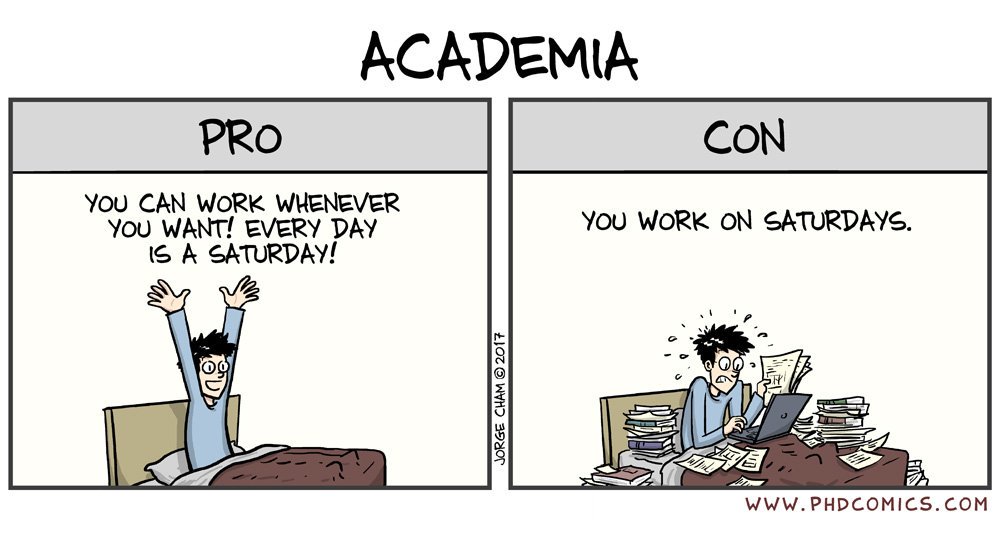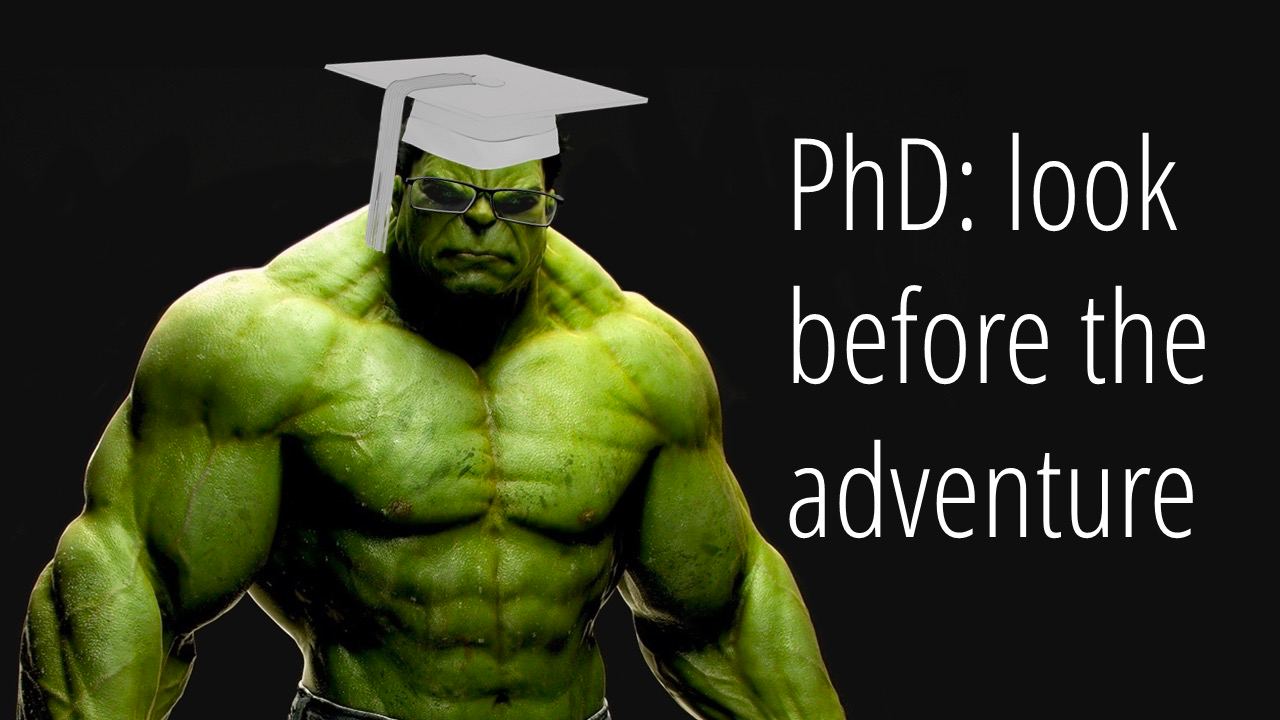My doctoral program (at last) officially started. Here I wanna briefly highlight my personal plans on it, Skoltech requirements, interesting reading and some related stuff.
Skoltech Requirements
The graph below illustrates how much credits (ECTS) one should gain to get a chance becoming a Doctor :)

Courses
You should take:
- 2 full major courses (although, you can take 6 + 3 + 3 = 12 ECTS). The list of courses is available here (you could also check at this site whether this course is major for you or not).
- 1 "innovation" course (aka Ideas to Impact or Intellectual Property)
- 1 philosophy course (6 credits)
- 1 course as a TA
- 1 course about teaching methodology (and this is not TA activity)
- Research Seminar. It is still not transparent requirement, but I suppose, that weekly seminar in your lab is enough for this criteria.
Internships
You should know, that there is an opportunity for funding your research trips (including conferences, schools and etc.). All information and manuals about this kind of activity could be found on SIS.
Thesis
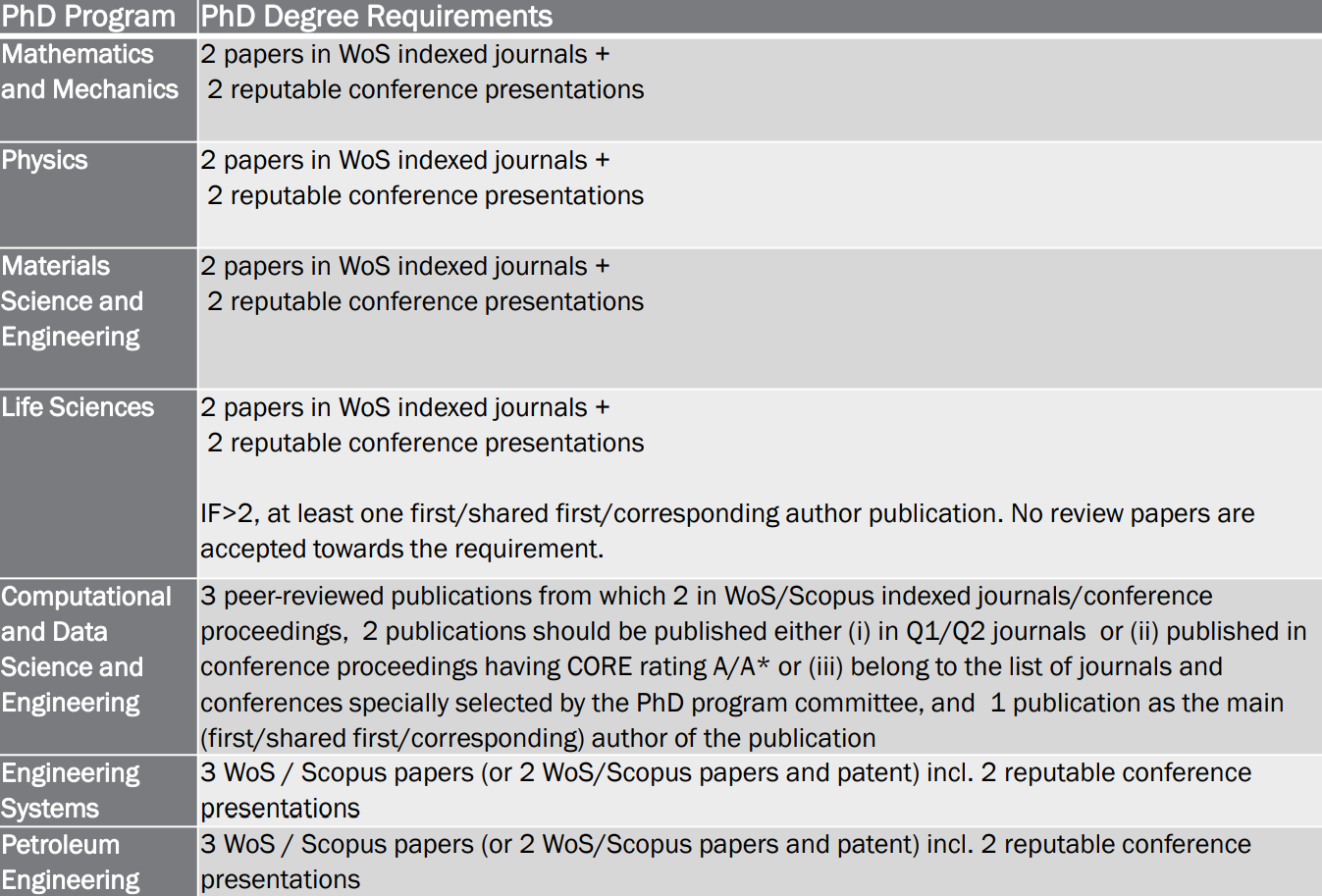
Each direction has its own requirements about the quality of your thesis. Rank of the conference could be checked here.
Other
The orientation presentation, which took place at the end of October could be downloaded here:
There are few more important things to mention about our study at Skoltech's doctoral program:
- Your scientific advisor should identify your Individual Doctor Committee, which consists of 3 members (including your scientific supervisor) working closely and regularly with you. They might be external members as well as Skoltech faculty.
-
Qualifying Exam. The latest information I found about qualifying exam is below. It has pass/fail grade and usually takes place after finishing all the coursework.
- You should submit your overall individual study plan by February 1, 2018.
- Each year your center will conduct an annual progress review, which might affect your scholarship.
- It seems unreasonable as yet, but still: after writing your core papers and thesis, you have to pass a tricky quest (which should be clarified carefully): give a talk on a scientific seminar, write an essay, invite 5 members of a jury committee, collect feedback from reviewers and so on. The only thing that makes sense right now: you should communicate with scientific society properly and be very proactive.
Guru's opinion
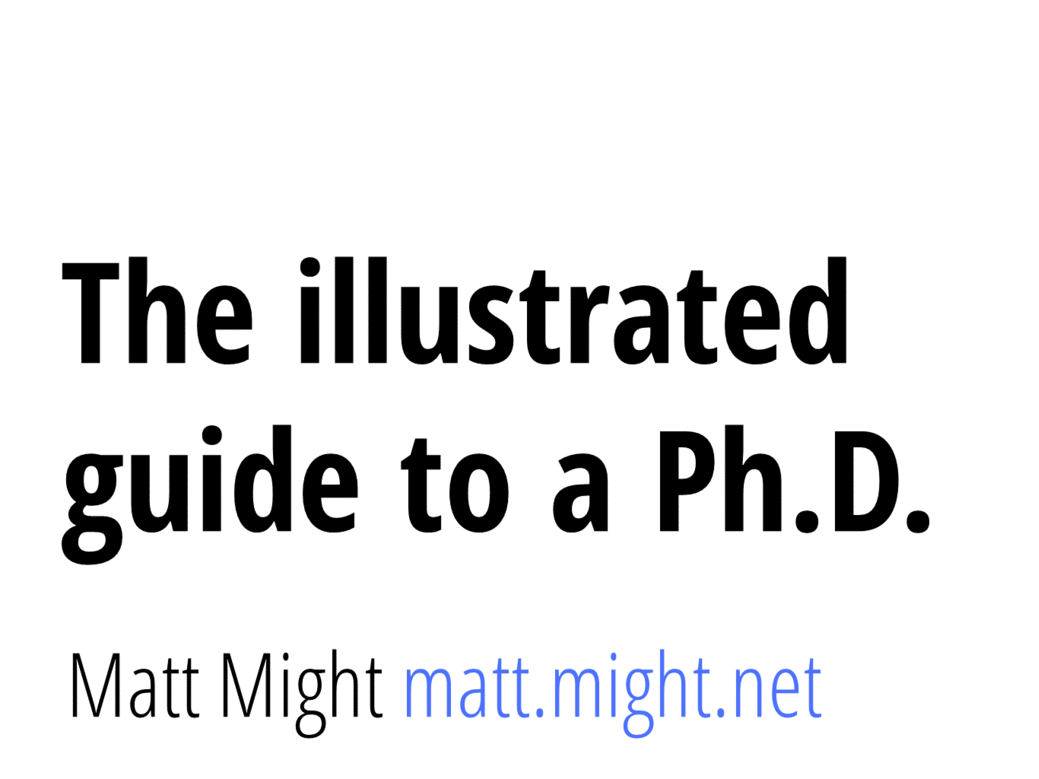
PhD Grind
Definitely, must-read book, written by Phillip Guo (MIT and Stanford graduate), which explains the entire experience about a PhD program in Computer Science. It illustrates inner experiences, thoughts, depressive and rush phases of a PhD student. It also covers questions about student-advisor relations, internships, sources of a research funding and importance of networking.
In my opinion, the most impressive insights come from the stories, when the author just cold e-mailed or talking with completely unfamiliar people from his field and those actions led to great publications, results and even professorship. It is also interesting, that author chose "startup" way to getting his dissertation done, which means collecting feedback, doing problems, that inspire yourself.
A Survival Guide to a PhD
Andrej is the Stanford graduate and Tesla AI director right now. After finishing his PhD he wrote an interesting article about such kind of investing a few years of your life. I strongly recommend reading this article on weekends with a cup of tea or coffee and a notebook to put your favorite insights from it. Here are mine:
Firstly, he describes the main pro's of doing PhD
You’re young and there’s really no need to rush. Once you graduate from a PhD you can spend the next ~50 years of your life in some company.
About future's choice:
Lastly, as a random thought I heard it said that you should only do a PhD if you want to go into academia. In light of all of the above I’d argue that a PhD has strong intrinsic value - it’s an end by itself, not just a means to some end (e.g. academic job).
He also suggests you choose research topic carefully and ambitiously:
People have a strange bug built into psychology: a 10x more important or impactful problem intuitively feels 10x harder (or 10x less likely) to achieve. This is a fallacy - in my experience a 10x more important problem is at most 2-3x harder to achieve. In fact, in some cases a 10x harder problem may be easier to achieve.
Things, that impressed me the most about writing the papers:
- Review papers: your "internal classifier" should be trained on a balanced training sample (you should read both the top-tier accepted papers and negative examples as well)
- Get the gestalt right: it is all about the form of your paper, citation's density, figures, sizes. Experienced reviewer might have a good classifier, based strongly on the general view of your paper.
- Identify the core contribution: Don't put all your experiments and thoughts in your paper in a random way. If you have more, than one important contribution - write more papers! :)
- Concentration: The paper is not just the report - it is a highly processed and very focused discussion of a problem, approach and context.
- Certain vocabulary: There are some keywords in each area of knowledge, which could indicate the quality and the style of a work. And no doubts, that's shouldn't contain any language mistakes.
- Internal deadlines 2 weeks prior: Great idea, don't you think so? Your colleagues have time to review your work carefully, and you still have time to carry out some missed experiments.
There is the rich discussion about this post, including such things, that his experiences and successes are not generalizable due to the circumstances and etc.
Personal plan
Here I will cover my personal ideas, hopes and plans for my battle for the degree :)
Courses
Information and Coding theory
It seems, that Fisher information concept could breathe a new life to the machine learning and (I hope) to the understanding the nature of generalization of such complex models as Deep Neural Networks. Moreover, it is just one of the most tasty and beautiful subfield of applied math.
Deep Learning
Every year Victor Lempitsky teach the hottest Deep Learning course at Skoltech. I want to take and pass it this year. What is more, it is the only one major course for me except information theory and Bayesian methods (which I passed during my master program) available at the moment of writing this post.
Teaching
Right in the current term (Nov - Dec, 17) I assist my scientific advisor prof. Oseledets at Numerical Linear Algebra course. Furthermore, I lead seminars on optimization methods at Moscow Institute of Physics and Technology.
Other
-
My personal Individual Study Plan is below. It should be emphasized, that this is preliminary version.
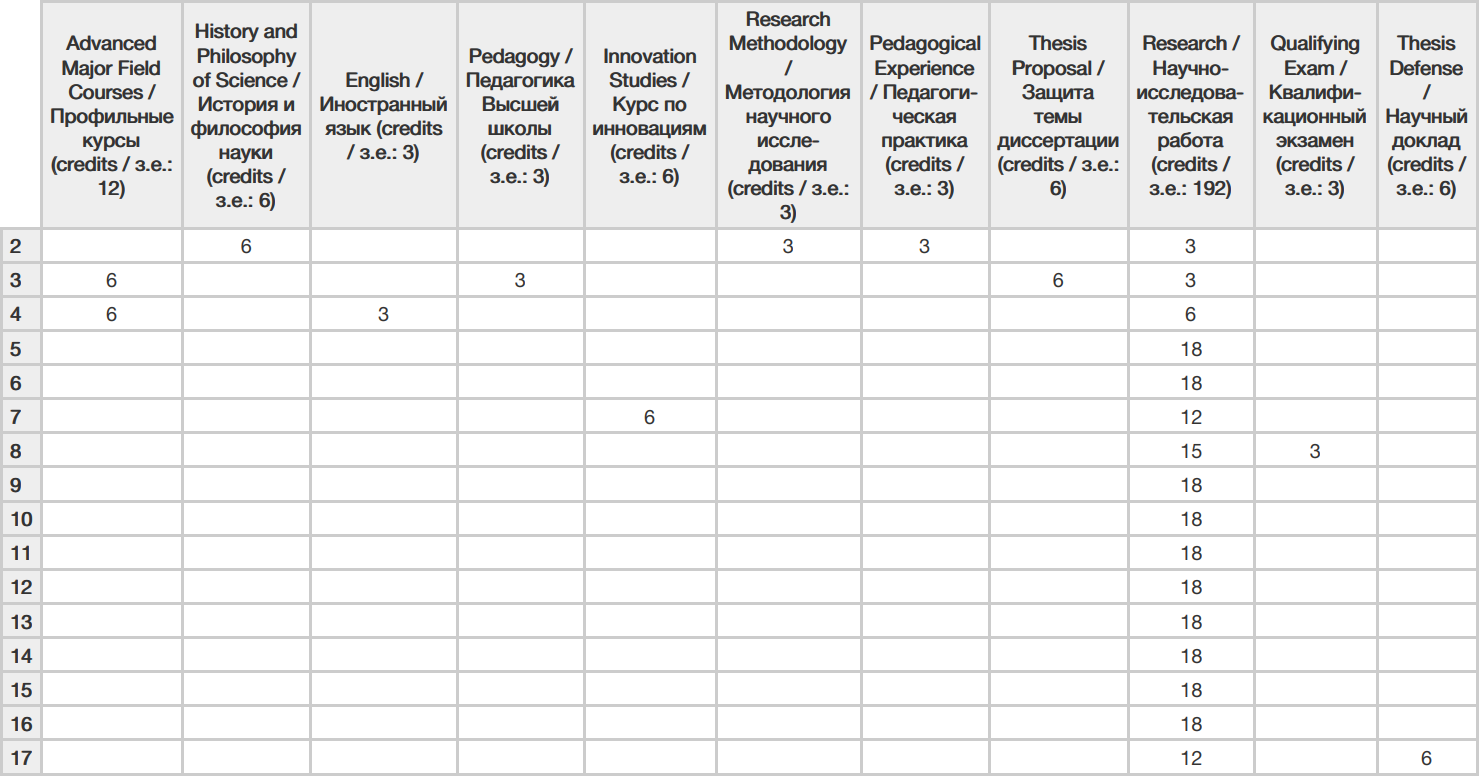
- I will take philosophy course by Ivan Lupandin and innovation course by Kelvin Willoughby.
- There could be useful to take English course (3 ECTS) in order to obtain Russian state degree.
- I will try to participate in summer internships during the first years of my PhD program. And the end of the year - exact application time of many summer programs. The deadlines are coming!
- Choosing thesis topic at the first year of study seems the most challenging step to do for me.
I would like to read this post after my graduation and reflect it in some way. And finally, this is my favorite picture from this series:
